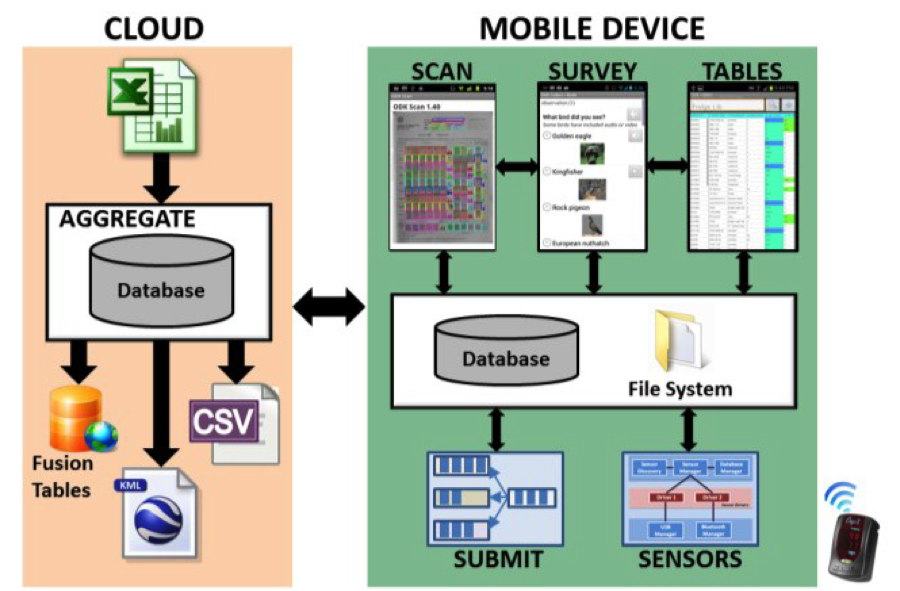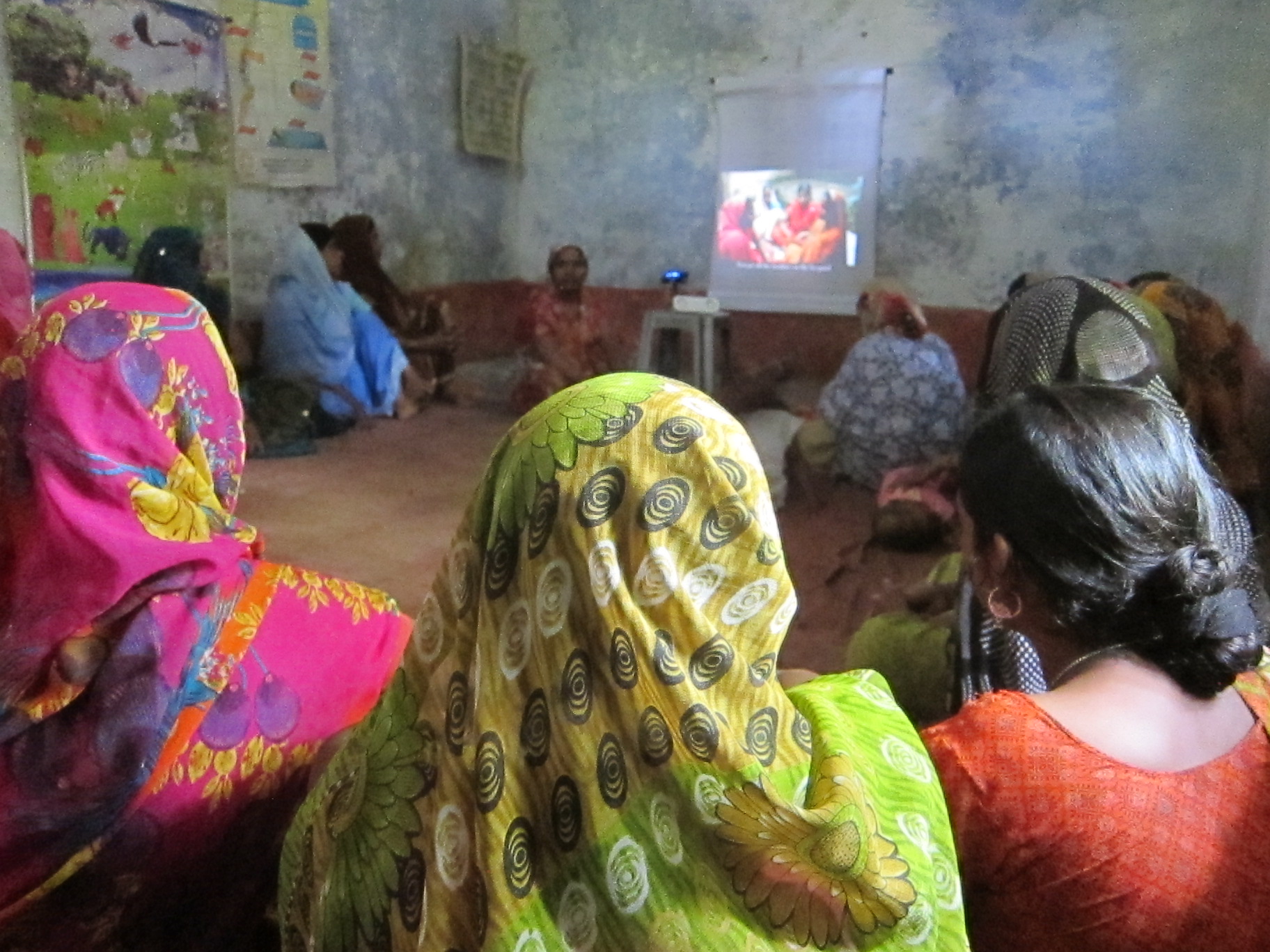Research Projects
Our research focuses on how technology can improve the lives of underserved populations in low-income regions. Our research has a wide range of themes. The HCI theme addresses challenges in interfaces for people with low literacy, even for basic technologies like SMS or voice calls. The system theme explores how complicated systems can be built with the assumption that the user has little or no IT support. The networks and communication theme focuses on building systems or applications that connect people in rural areas that have little or no connectivity available. The security theme looks at all possible threats that current systems in low resource area are exposed to and how to handle those threats. The behavior change communication theme explores how technology can educate and introduce best practices among people in slums and/or rural parts of the world. The global health theme looks at applications that support analysis, interfaces and education for better health care in developing regions. The Data Analytics theme aims to provide support for data cleaning, understanding the data and running complex analysis for users with little knowledge about the data or the analytics process.
Human Computer Interaction (HCI)
It is challenging to design technologies using standard HCI methods for marginalized communities because they face a complex array of socioeconomic barriers, literacy constraints and infrastructural challenges. There are enormous research opportunities at the intersection of HCI and ICTD. HCI research in our group focuses on: 1) Understanding how technologies are impacting lives of marginalized communities in developing regions and 2) Designing, building and evaluating low-cost technological solutions for underserved communities to provide them access to health, education, civic engagement, crowdsourcing systems and social media platforms. We use several technology designs including text messages, speech-based interfaces, and low-cost usable smartphone applications to realize our goal. Some of our past research includes designing a voice-based social media platform for low-income low-literate people in India, digitizing paper-based global development data using a smartphone application, engaging pregnant women in Kenya with a hybrid computer-human SMS communication system, and analyzing diagnostic tests for infectious disease using a smartphone application. Our technology interventions are deployed in several countries in Southeast Asia and the African continent including India, Pakistan, Kenya, Zimbabwe, South Africa, Mali, Somalia.
- Projecting Health
- Community-Led Video Education, based on locally produced video content More >>
- Sangeet Swara
- Voice-based social media platform for low-Income low-Literate people
- Respeak
- Voice-based crowd-powered speech transcription system
- ODK Scan
- Digitizing paper-based data in global development
- Community Cellular
- Empowering communities to solve their own rural communication problems More >>
Systems

Conventional cutting-edge technology can be inappropriate for some low-resource contexts because of design assumptions such as constant connectivity to the cloud. Our lab designs, implements, and evaluates systems using various computing and communications technologies to support sustainable international development in resource-constrained environments. Many research challenges within the computing for development space intersect with many traditional areas of systems research (e.g., networking, system abstractions, mobility, security). However, research challenges in ICTD are driven by the on-the-ground realities that cause some conventional computing solutions to be inappropriate due to issues of: affordability, infrastructure constraints, institutional capacity, technical support, etc. Our lab builds solutions and reusable frameworks that provide out-of-the-box solutions that users can deploy in diverse contexts that can vary in the availability of connectivity, low-cost devices, and power. Research topics include: mobile systems and applications, low-cost wireless connectivity, intermittent networks and systems, power-efficient systems, low-cost computing devices, mechanisms for emergency and urgent communications, location-aware systems, middleware (e.g., caching and other mechanisms for minimizing complexity, energy, latency, storage), adapting content and applications for local languages, design and evaluation of applications and in-depth case studies (e.g., public health, microfinance, agriculture, e-governance, education, monitoring, disaster management).
- CacheCourier
- Web browsing for intermittently connected environments
- Open Data Kit
- Mobile-based data collection tools More >>
- Community Cellular
- Empowering communities to solve their own rural communication problems More >>
- Community LTE
- CoLTE is an open-source toolkit that enables people to start their own LTE networks More >>
Networks and Communication
Billions of people throughout the world live with limited or no network access. The cost of this isn’t just a lack of access to the modern global economy, but also disconnection from their friends, family, and social networks. Our networking research investigates the causes of this divide, technology interventions that can help, and policy solutions to encourage rural access. To do this we look at a suite of features from the social (ownership, governance) to the technical (power, cost). We believe strongly in the value of iterative design, local empowerment, and community, and leverage these strongly in any intervention.
- Community Cellular
- Empowering communities to solve their own rural communication problems More >>
- IMSI Catcher Catching
- Building tools to both counter, and evaluate counters to, IMSI Catchers
- Interledger Routing
- Interledger is a mobile money routing protocol. There are numerous questions about the routing inside of the protocol. More >>
- Community LTE
- CoLTE is an open-source toolkit that enables people to start their own LTE networks More >>
Security
As technology usage increases across the globe, it is important that the systems used are secure. This is especially true for systems in novel contexts with users that have different assumptions about security that are using technology in new ways. The lab investigates how these scenarios differ from conventional security research as well as how these systems can be built securely.
- Mobile Money Security
- Developing tools to enhance and validate the security of Android Apps for financial services
- IMSI Catcher Catching
- Building tools to both counter, and evaluate counters to, IMSI Catchers
Behavior Change Communication

Often the most effective solutions for improving development health indicators are deceptively simple - the challenge is encouraging people to adopt new practices. Behavior change theory has developed complex models of barriers, attitudes, social norms, and environmental factors which influence the adoption of new practices. Our lab explores how ICTD interventions act as a catalyst for behavior change by providing access to information, forums to discuses new practices, and simple timely reminders. In our projects we demonstrate that technology can amplify the influence of a single ASHA in Uttar Pradesh and extend the reach of a nurse in Nairobi. Working with local and global partners we are working to demonstrate the effect of ICTD interventions on behavior change adoption.
- Projecting Health
- Community-Led Video Education, based on locally produced video content More >>
- Mobile Watch
- SMS based information dissemination system for awareness
Global Health
An important domain for ICTD research is investigating how computing and information technologies can help address the challenges in improving global health. This ranges from developing tools that improve the ability of front line health workers to diagnose diseases to working on systems that strengthen reporting of health data that allows better decision making. Work conducted by the group is done in close partnership with organizations with expertise in global health such as PATH and the UW Department of Global Health.
Projects in global health include mPneumonia and Projecting Health in collaboration with PATH, and MWach in collaboration with the Department of Global Health. Recent graduates Nicki Dell developed ODK Diagnostics as part of her dissertation work, and Rohit Chaudhuri led work on the FoneAstra system which has been used to monitor pasteurization for Human Milk Banking.
- Projecting Health
- Community-Led Video Education, based on locally produced video content More >>
- Mobile Watch
- SMS based information dissemination system for awareness
- Cold Chain Monitoring
- Improving data availability and analysis around vaccine availability in rural areas
Data Analytics
Data analytics can enable organizations to make better decisions and gain useful insights. Therefore, data digitalization has been the focus of governments and global development agencies for the past decade, but many of these efforts have been hindered with inconsistent formats and data quality issues. Organizations need tools to help them understand and analyze their data coming from various sources to avoid investing large amounts of time manually cleaning and aligning these datasets. Our lab works on identifying these inconsistencies and helping organizations semi-automate the process of cleaning and aligning different datasets. Additionally, our lab develops platforms that assist non-programmers running analysis on their data and enable data sharing and repeatability of data analysis so organizations can work together to improve data analysis.
- Dextra
- An intelligent data cleaning tool
- Mezuri
- Data processing platform for ODK
- Cold Chain Monitoring
- Improving data availability and analysis around vaccine availability in rural areas
- Community Cellular
- Empowering communities to solve their own rural communication problems More >>
Digital Financial Services
The University of Washington has established the Digital Financial Services Research Group to investigate technologies that will improve the ability of banks and mobile operators to deploy Digital Financial Service (DFS) products that reach the poor. The goal is to develop and deploy technological solutions to specific challenges that impede the introductions and wide scale deployment of these financial products. Low profitability, lack of client demand, and the outright failure of many DFS launches can be traced back to difficult barriers and frictions that hinder the business model and scalability of DFS systems. Many of these barriers and frictions could be addressed by high potential emerging technologies but often the requisite translation of these technologies from the lab or from other sectors into usable tools is not happening with the necessary urgency.
- Mobile Money Security
- Developing tools to enhance and validate the security of Android Apps for financial services
- Interledger Routing
- Interledger is a mobile money routing protocol. There are numerous questions about the routing inside of the protocol. More >>
